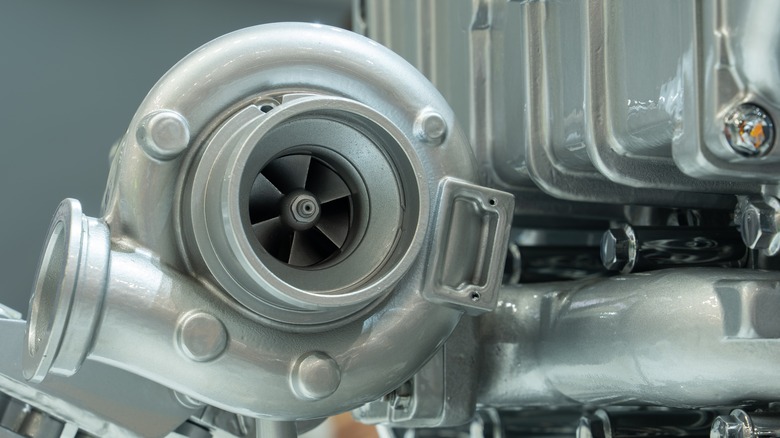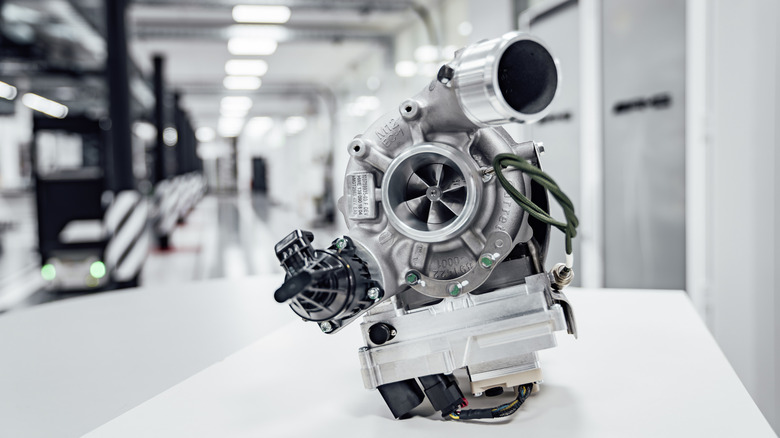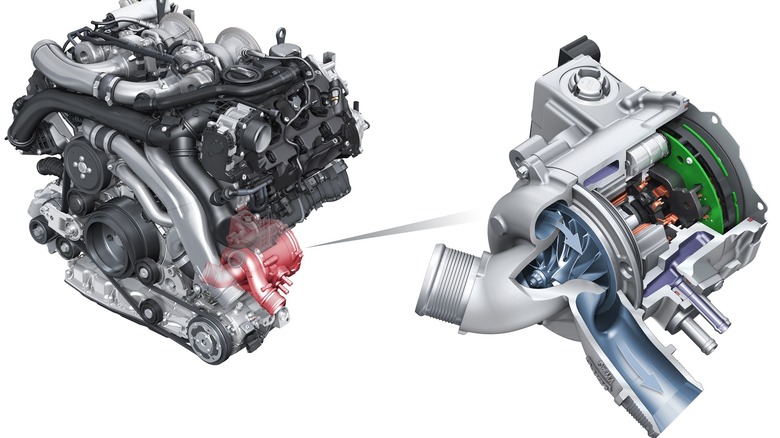Why There's No Such Thing As A Fully Electric Turbocharger (Yet)
Decades ago, turbochargers used to be special, almost mythical. If you had a turbocharged version of a car that typically didn't have a turbo, you had some real street cred, especially if you installed it yourself and it actually worked properly. Now, with engines like Ford's EcoBoost line and others, turbos are standard equipment on a large portion of cars considered to be fairly pedestrian.
It's not nearly as special as it once was, and most of the problems associated with turbocharging (i.e. complexity, reliability, and cooling) have mostly been overcome by either the aftermarket industry or automakers. Even so, adding a turbocharger to a car that didn't come with one can be a tough task for any home mechanic, and an expensive bill if you take it to a shop.
Turbochargers are essentially compressors that rely on the exhaust gases of the engine to spool up and force air back into the engine, providing the air needed for combustion inside the cylinder. More air and more combustion equals more power. If you want to install one yourself, running the appropriate exhaust piping, manifolds, and cooling lines takes time, money and effort. The concept of an electrically powered turbocharger bypasses that process entirely; you hypothetically just plug it in and you're off to the races.
Electrically assisted turbochargers
If you've surfed around eBay or Amazon for car parts, you've likely seen products that advertise themselves as an electric turbocharger (sometimes also called an electric supercharger). These products are largely scams, and any power the device actually generates is almost negligible. The 12-volt electrical system on your average car simply can't pump enough juice into a device that can produce any meaningful amount of compressed air to shove back into the engine for a gain in power.
Automakers like Audi and Mercedes-Benz, however, have tackled the concept of electric turbochargers from a different angle altogether. While a backward mechanic may want to simplify the process of installing a turbo through electrification, Audi and Mercedes want to make turbos better and more efficient through electrification.
One of the biggest drawbacks to a turbocharged car is what's called "turbo lag." When you slam the accelerator, it takes time — sometimes a few seconds — for the exhaust gases to spool the turbocharger to the appropriate speed (oftentimes more than 200,000 rpm) where it can work effectively. In racing or performance trials, those seconds lost to turbo lag can be detrimental.
The electrified turbo pioneered by Mercedes in Formula 1 uses a small motor integrated into the turbocharger itself to get it up to speed, so it's always ready when needed. This, however, is an electrically assisted turbo, as it still uses exhaust gases once its reached the appropriate speed. Mercedes has had this technology in consumer cars since 2020, and it's really only made possible through a 48-volt electrical system seen in contemporary cars that are often called "mild hybrids."
Not the highest priority
Audi solves the problem of turbo lag another way entirely. It uses a small compressor, also powered by a 48-volt electrical system, to essentially "pre-charge" the existing conventional turbochargers. SlashGear reported on this turbo-lag solution back in 2020 when Audi put the technology in the S7. Both Mercedes and Audi's electrically assisted turbochargers certainly solve existing problems with turbos, but the turbochargers themselves are only assisted, not fully electric. It's a hybrid.
Fully electric turbochargers, at the moment of writing, do not exist at any widespread level. However, with the advent of 48-volt electrical systems and generally more widespread hybridization, that doesn't mean the technology isn't possible at all. Automakers and aftermarket companies just haven't gotten there yet.
Plus, with the widespread use of more conventional turbochargers and the ever-encroaching shadow of an all-electric future, making a plug-and-play electric turbocharger for any gearhead to shove into a hand-me-down minivan with little effort likely isn't the automaker's biggest priority.


